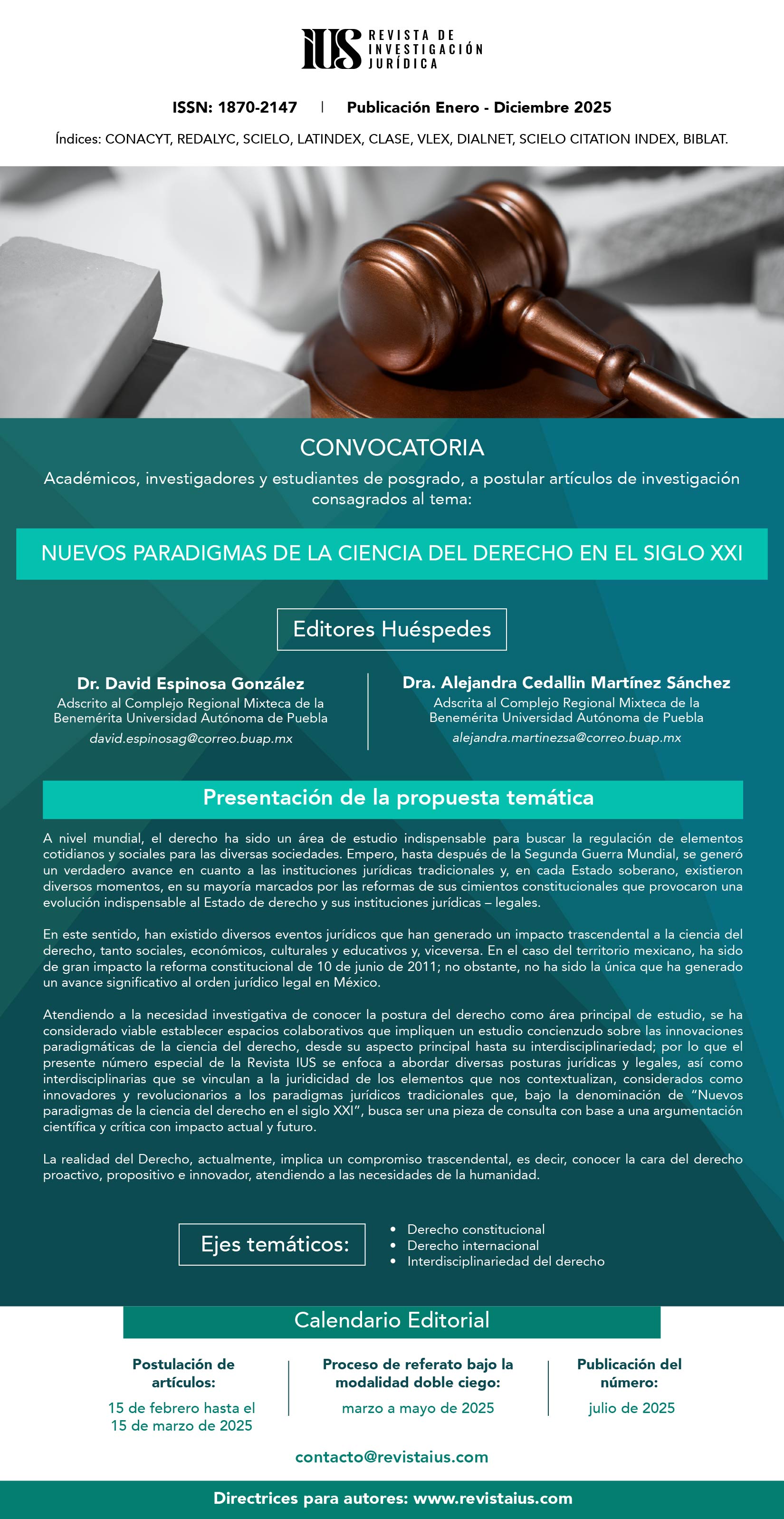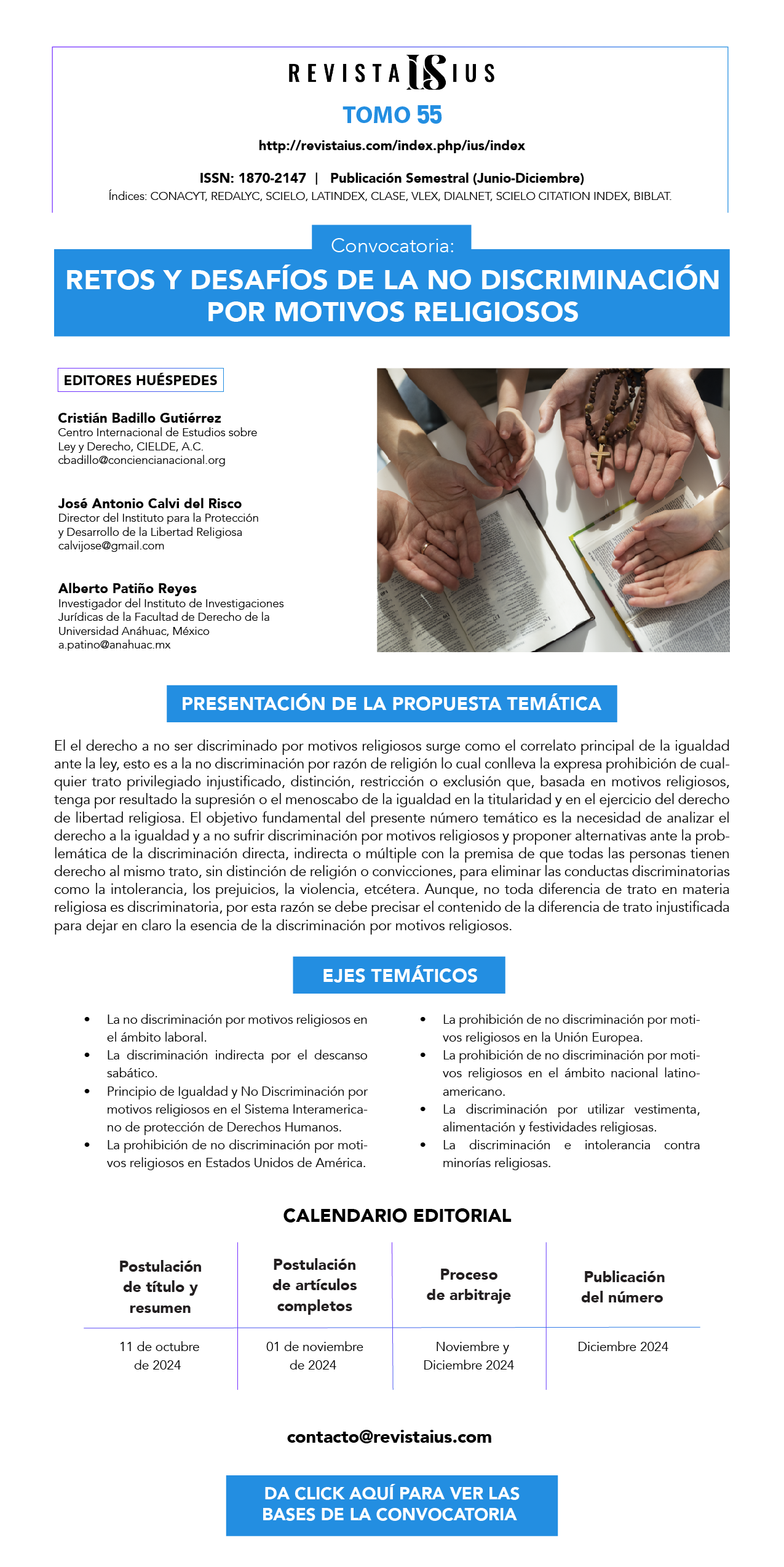La justicia restaurativa como uno de los fundamentos para la reparación del daño por el delito causado a la víctima u ofendido
DOI:
https://doi.org/10.35487/rius.v14i46.2020.558Palabras clave:
Justicia restaurativa, reparación del daño, víctima u ofendido, proceso penal acusatorioResumen
La ineficacia judicial trae como consecuencia el incremento de la impunidad y el reclamo social ante la falta de la reparación del daño cometido por el delito. Ante esta situación, se reforma el sistema de justicia penal en México a uno de corte acusatorio, respetuoso de los Derechos Humanos de todos los involucrados en el drama penal.
La reforma de junio de 2008, establece diversas salidas alternas que posibilitan la resolución de conflictos de forma diferenciada, surgiendo oportunidades para reparar el daño causado por el delito mediante métodos alternativos. A esta forma de resolución de conflictos se le denomina “justicia restaurativa”, misma que tuvo sus orígenes en base a diversos movimientos sociales, que surgieron por el reclamo de la sociedad ante la ineficacia del Estado al procurar e impartir justicia, sobre todo en lo relativo a la reparación del daño causado por el delito.
Descargas
Citas
BIBLIOGRÁFICAS
Bardales Lazcano, Erika, Medios alternativos de solución de conflictos y justicia restaurativa, México, 2011, Edit. Flores Editor y Distribuidor, p. 4.
Calvo Soler, Raúl, Donde la Justicia no llega, cuando el proceso judicial no acompaña. Editorial Gedisa, Barcelona, España, 2018,
Díaz Madrigal, Ivonne Nohemí, “La mediación en el sistema de justicia penal: justicia restaurativa en México y España”, México, 2013, ed. Universidad Nacional Autónoma de México, pp. 27.
Ferrer Mac-Gregor, Eduardo y Escalante López, Sonia, Derecho Procesal de los derechos humanos, segunda edición, México, 2014, Edit. Porrúa, p. 230.
Macedonio Hernández, Carlos Alberto et al, La reparación del daño de las víctimas u ofendidos por el delito en el estado de Yucatán, 2017, editorial Universidad Autónoma de Yucatán, Mérida, México, p. 107.
Morineau Iduarte, Martha, e Iglesias González, Román, Derecho romano, México, Ed. Oxford, 2010, pp.196.
Neuman, Elias, La Mediación Penal, 2ª, Editorial Universidad, Buenos Aires, Argentina, 2005.
Rawls, John, Teoría de la Justicia, 6º Reimpresión, Editorial Fondo de Cultura Económica, México 2006.
Soler, Sebastián, Derecho Penal Argentino, Tomo I, 8ª Reimpresión, Edit. TEA, Buenas Aires, 1978.
Zamora Grant, José, La Víctima en el Sistema Penal Mexicano, Instituto Nacional de Ciencias Penales, México, 2002, pp. 69-71.
Zehr, Howard, El pequeño libro de justicia restaurativa, Estados Unidos de América, Ed.Good Books, 2010, pp. 11
PÁGINAS ELECTRÓNICAS
Zehr, Howard, “Retributive Justice, Restorative Justice." New Perspectives on Crime and Justice”.
http://www.filosoficas.unam.mx/~tomasini/CONFERENCIAS/Talion.pdf consultado el 12 de septiembre de 2018.
http://www.revistadelauniversidad.unam.mx/3907/pdfs/107-108.pdf consultado el 15 de septiembre de 2018.
https://archivos.juridicas.unam.mx/www/bjv/libros/7/3104/38.pdf consultado el 22 de septiembre del 2018.
http://www.justiciarestaurativa.org/intro/practices/mediation consultado el 23 de septiembre de 2018.
http://www.cbpoc.net/wp-content/uploads/2014/01/1-Caracter%C3%ADsticas-de-la-ley-de-Mois%C3%A9s.pdf consultado el 25 de septiembre de 2018.
http://cidac.org/wp-content/uploads/2016/03/tinker.pdf consultado el 28 de septiembre del año 2018.
Publicado
Número
Sección
Licencia
Revista IUS por el Centro Internacional de Estudios sobre Ley y Derecho. se distribuye bajo una Licencia Creative Commons Atribución-NoComercial-CompartirIgual 4.0 Internacional.
Autorizamos a sus colaboradores a que suban una copia de sus trabajos publicados en sus webs personales o en cualquier repositorio de acceso abierto, siempre y cuando se mencione específicamente a la Revista IUS como fuente original de procedencia, citando el año y número del ejemplar respectivo y añadiendo el enlace a la página web donde este órgano editorial puede ser consultado in toto, de manera abierta y gratuita en: http://www.revistaius.com
Las y los lectores tienen libertad para:
Compartir, copiar y redistribuir el material en cualquier medio o formato.
El licenciante no puede revocar estas libertades en tanto usted siga los términos de la licencia.
De acuerdo con los siguientes términos:
Atribución: El lector debe reconocer el crédito de una obra de manera adecuada, proporcionar un enlace a la licencia, e indicar si se han realizado cambios. Puede hacerlo en cualquier forma razonable, pero no de forma tal que sugiera que tiene el apoyo del licenciante o lo recibe por el uso que hace.
No comercial: El lector no puede hacer uso del material con fines comerciales.
Si remezcla, transforma o crea a partir del material, deberá difundir sus contribuciones bajo la misma licencia que el original.
Cargos por gestión de artículos
Revista IUS no cobra tarifas por recibir, procesar o publicar los artículos (Article Processing Charge [APC]) enviados por los autores.





